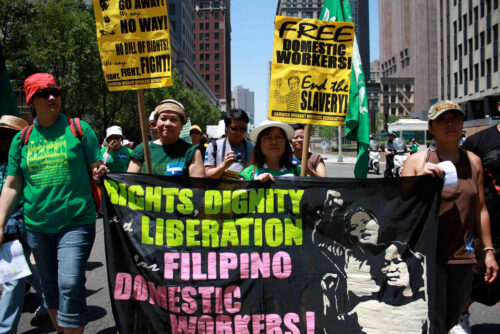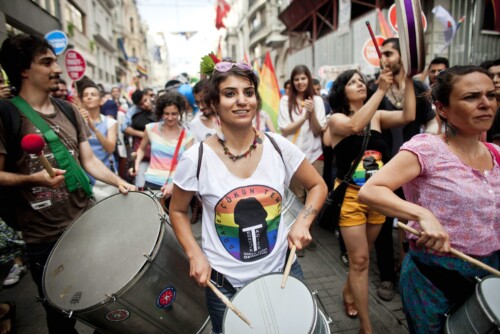The Limited Economy of Sexual Rights
Sexual-rights activists have been drawn to the global justice movement as a locus of contemporary radical energy. They see the Forum as a relevant site in which to stage conversations, forge networks, and to coexist with, if not actively link to, the global justice movement. 1 Nearly two dozen feminist organizations (most addressing women’s sexual rights) participate in the governance of the Forum. The LGBT South-South Dialogue, the only gay organization represented on the WSF’s governing board, has hosted Forum panels on the connections between neoliberalism, imperialism, heteronormativity, and the material conditions of queers in the global south. 2
One Forum event offers a concrete example of the ways activists are exploring convergences between sexual and economic politics. Organized by the Feminist Dialogues, 3 a network of women’s organizations in the global south, this event modeled dialogue across four political sectors: feminism, LGBTQ, labor, and race/caste. Each speaker discussed points of convergence as well as critique of other movements. A gay activist from South Africa acknowledged the LGBT movement’s lack of attention to class and race, for example, but also noted the failure of India’s caste-organizing and international-labor movements to address sexuality in their work.
Beyond a handful of examples like this and LGBT South-South Dialogue, however, international sexual-rights and LGBT organizations have rarely forged operative networks with transnational struggles for economic justice. A feminist call for the Forum to incorporate attention to sexual and reproductive rights asserts that sexual diversity and sexual emancipation “are part of the same struggles in which the right to land and the right to express one’s sexuality both contribute to the construction of radically democratic futures.” 4 Yet, this call does not explain how these are part of the same struggle—a problem replicated in other conversations about the relation of sexual justice to economic justice. Perhaps understandably, sexual-rights activism targets sources of explicit oppression of non-normative sexuality—the state, medicine, religion, and public culture. Few have dedicated much conceptual effort to articulating the relevance of sexual politics for critiques of global capital and visions for alternative worlds. For these sexual-rights advocacy, the global-justice movement serves as a dynamic staging ground rather than a source of collaboration on political projects.
Connections or failures of articulation among sexual and economic movements follow specific political histories and institutional contexts. Sexual-rights discourse, notably, is inflected by decades of participation in the UN-NGO orbit which, from the late 1980s until recently, presented the main vehicle for transnational advocacy for such issues as reproductive health, HIV/AIDS, sexual violence, or human rights of sexual minorities. This UN-NGO arena collaborates more or less with market and state structures. According to critics, sexual-rights advocates rely on frameworks—specifically, liberal formulations of sexual autonomy and reproductive rights—that prevent them from addressing broader social-justice concerns, 5 especially economic redistribution. 6 In practice, NGO advocacy’s reliance on institutionalized political forms that distinguish economic from political rights has made it difficult to argue effectively for 1) the indivisibility of rights and 2) a substantive emphasis on capacities to realize rights. Thus, in radical circles, NGOs are often seen as the benevolent face of hegemonic powers. 7 Professionalized modes of advocacy within the UN-NGO orbit thus curtailed sexual-rights advocates’ connections to the global-justice agenda (which remain suspicious of NGOs). It also eclipsed earlier activism for women’s sexual mobility or queer liberation, whose forms and networks were more linked—at least in spirit—to radical left politics. 8
Indeed, many sexual-rights advocates were themselves frustrated with these limits, which explains the choice to align their projects with the WSF and the alter-globalization movement. At the same time, the problematic engagements with the UN-NGO orbit also generated the very capacities of activists to bring sexual politics to a radical transnational political venue like the WSF.
- Examples of WSF activities relevant to sexual politics include the following: In Mumbai in 2004, a panel addressed “LGBT alternative strategies to exclusionary globalization,” and Indian groups working for LGBTQ, male-to-female kothi, sex workers, and people living with HIV/AIDS formed a coalition called Rainbow Planet. The subsequent 2005 Porto Alegre Forum included a tent dedicated to “sexual diversity,” panels that addressed LGBT issues, and stalls representing a Brazilian sex worker organization and the International Gay Games. At the 2007 Forum in Kenya, sexual rights were discussed at several panels and were one of the topics addressed in commentary. Oishik Sircar, a 2008-09 Fellow at the India Institute for Critical Action: Centre In Movement (CACIM), is researching sexual diversity organizing at Social Forums in India. For a critical overview of organizing for reproductive and sexual rights and for LGBT/sexual diversity issues at the WSF, see Klugman, “Parallel or Integrated ‘Other Worlds.'”[↑]
- The LGBT South-South Dialogue has published one of the few activist analyses of queer issues in relation to globalization. See Irene León and Phumi Mtetwa eds, Globalization: GLBT Alternatives (Quito, Ecuador: GLBT South-South Dialogue, 2003).[↑]
- “A Dialogue Between Movements,” moderated by Sunila Abeyasekara, and organized by a network comprised of the National Network of Autonomous Women’s Organization (India), Articulacion Feminista Marcosur, Development Alternative for Women in New Era, Women’s International Coalition for Economic Justice, FEMNET-Africa, INFORM-Sri Lanka, and ISIS International. For more information, see “Feminist Dialogues 2005 Focus on Militarism, Fundamentalism and Globalisation,” Isis Women, 2005 www.isiswomen.org/pub/we/archive/msg00202.html#fd (accessed February 18, 2006).[↑]
- Isis Women, “Another World is Possible in Diversity.”[↑]
- There are numerous critiques of the human rights framework as the basis for feminist, and by extension, queer claims to justice. Most of these critiques are based on strategic grounds (e.g. rights limit and constrain results) or on conceptual grounds (e.g. the flaws of liberal logic). For this critique in relation to sexual rights, see Klugman, “Parallel or Integrated ‘Other Worlds'”, and Wilson, “The transnational geography of sexual rights.”[↑]
- For a fuller exploration of the legacy of UN-NGO organizing on feminist participation in the WSF, see Klugman, “Parallel or Integrated ‘Other Worlds'”; and Ara Wilson, “Feminism In the Space of the World Social Forum,” Journal of International Women’s Studies 8.3 (April 2007): 1-27. Some long-term consequences of UN-NGO organizing have been the bureaucratization of political language with UN shorthand (such as MDGs for Millenial Development Goals) and an emphasis on negative rights, that is, freedom from harm, like trafficking in women or sexual violence, The major organizations concerned with global queer sexual rights—the International Gay and Lesbian Human Rights Commission (IGLHRC), the International Lesbian and Gay Association (ILGA), and Amnesty International—have yet to advance robust arguments about the material dimensions of sexuality or the links between economic justice and sexual justice. See Wilson, “The Transnational Geography of Sexual Rights.” [↑]
- On the complicity of NGOs with global powers, see entries in: Michal Feher, Gaëlle Krikorian, and Yates McKee eds, NonGovernmental Politics (New York: Zone Books, 2007). See also Gayatri Spivak, “‘Woman’ as Theatre: United Nations Conference on Women, Beijing 1995,” Radical Philosophy (1996) 75: 2-4.[↑]
- For an account of the transformation in radical feminist politics resulting from democratization and globalization in Latin America, see Alvarez, “NGOization.”[↑]



